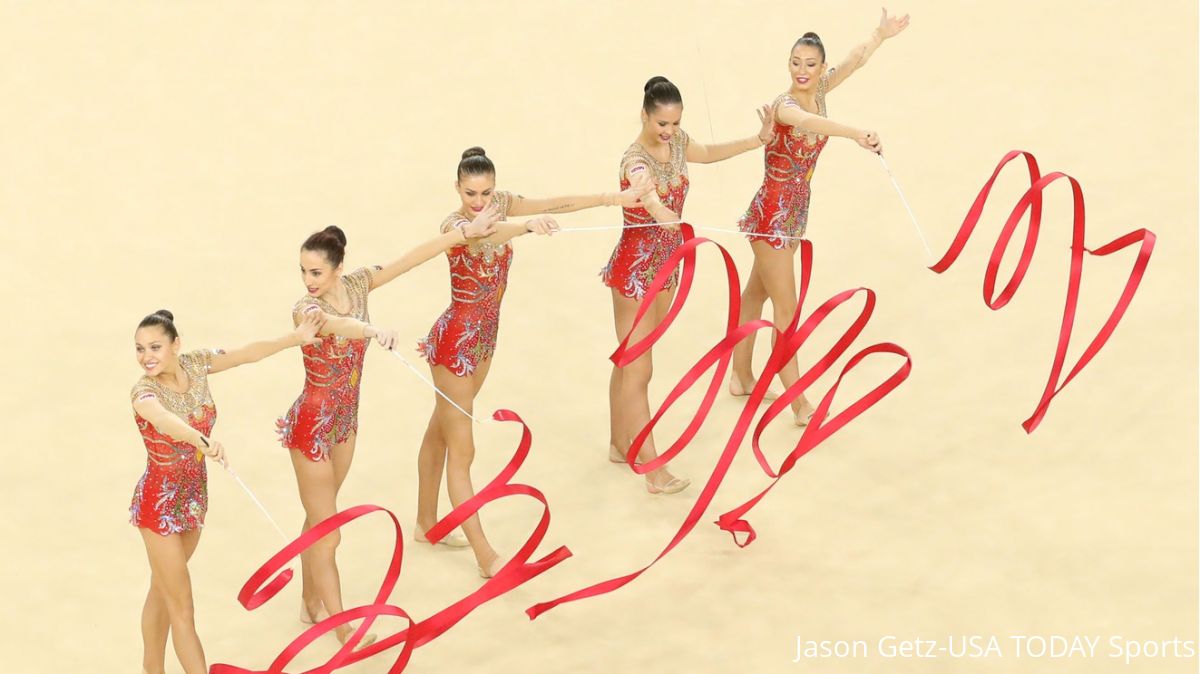Gymnasts & Groups To Watch At The Minsk Rhythmic World Challenge Cup
Gymnasts & Groups To Watch At The Minsk Rhythmic World Challenge Cup
Russian twins Dina and Arina Averina lead the gymnasts to watch at the 2019 FIG Rhythmic Gymnastics World Challenge Cup in Minsk, Bulgaria.

The 2019 FIG Rhythmic Gymnastics World Challenge Cup series continues in Minsk, Bulgaria, from Aug. 16-18. Gymnasts from more than 30 countries will be competing for medals in individual and group events, but the top gymnasts to watch are from Europe and include three Olympic hopefuls.
FloPro users in Canada can watch the Minsk World Challenge Cup live here on FloGymnastics.
Alexandra Agiurgiuculese (ITA)
Argiurgiuculese is a two-time World Championships medalist who was the first Italian rhythmic gymnast to win an individual medal in a FIG World Cup final. At last year's World Championships in Sofia, Bulgaria, the Romanian-born gymnast helped Italy win the team bronze, while she individually earned bronze for ball.
She made her senior debut in 2017 and won four World Cup medals. In her first senior season, she also competed at the World Championships in Pesaro, Italy, and became the first Italian rhythmic gymnast to win the Longines Prize for Elegance.
The highlight of her 2018 season was certainly winning bronze in the ball final at World Championships as she ended Italy's individual rhythmic gymnastics world medal drought of 27 years. Argiurgiuculese was also the 2018 Mediterranean Games all-around champion but has the most potential to medal on ball where most of her individual medals have come from.
Arina Averina (RUS)
Not to be confused with her twin sister and fellow elite rhythmic gymnast Dina, Arina is an eight-time World Championships medalist and the reigning European champion after winning the individual all-around title at the 2018 European Championships.
At this year's European Championships, she also found individual success, winning gold in ball and clubs. During the 2019 World Cup circuit, she won two silvers in the all-around, silver in ribbon and clubs, and gold in ball and hoop. And in the 2019 Grand Prix circuit, Averina has earned 13 medals―including six gold―in four meets.
Averina is able to contend for medals on every event and has medaled on each event and in the all-around at major competitions, so she's one to watch in every apparatus. However, she's had the most success with ball this year. She won ball at Grand Prix Brno, the European Championships, the Pesaro World Cup, and Grand Prix Thiais and earned bronze at Grand Prix Marbella.
Dina Averina (RUS)
Dina is just as talented in rhythmic gymnastics as her twin, as she is the two-time reigning world and Russian all-around champion.
This year she's won five all-around titles, including the European Games crown, and 13 apparatus titles across seven meets. She has four golds each this year on hoop and ribbon but also has three in clubs and two for ball. So from a medal perspective, Dina is best on hoop and ribbon but really has the ability to medal on any event. And she has medaled with at least one apparatus in every major competition this year.
Bulgarian group
The Bulgarian group has been a contender in the World Cup and World Challenge Cup circuit all year long for the 4 clubs and 3 hoops competition. At the Pesaro and Baku World Cups, Bulgaria won the event and earned silver in Sofia. In this year's first World Challenge Cup in Guadalajara, Mexico, in May, the Bulgarians were golden once again.
The group has great synchronicity and nice turns but also puts movement canons to good use, creating rhythm and pattern using their choreography and the apparatus.
Russian group
The Russian rhythmic group is just as capable of contending for international medals as its individuals are. During this year's World Cup and World Challenge Cup circuit, the Russian group has medaled in both 5 balls and 4 clubs and 3 hoops.
Their 5 balls routine has consistently placed this year, earning silver at the Pesaro World Cup, bronze at the Sofia and Tashkent World Cups, and gold at the Baku World Cup and Guadalajara World Challenge Cups. Their 4 clubs and 3 hoops routine hasn't seen as much hardware but has still earned a few medals. In Tashkent, they were golden, and in Baku and Guadalajara, they received silver.
In Guadalajara, they had a few synchronicity and control issues during 5 balls, but their routine was full of interesting and fun skills that made it clear why it's a medal-worthy routine. The routine has a few partner work tricks and even some lifts included, and their illusion turn catch combination is excellent.
Ukrainian group
Ukraine is another country that's capable of contending for medals in both group apparatus. In the 2019 World Cup circuit, the Ukrainian group won 5 balls in Tashkent and got bronze in Baku. The group's 4 clubs and 3 hoops routine was more successful with a silver in Pesaro and Tashkent, gold in Sofia, and bronze in Baku.
The gymnasts demonstrated good control with the apparatus in their 4 clubs and 3 hoops routine in Sofia. Their fouette turns were clean and synchronized and also had nice control on their penches. If they are able to replicate that performance in Minsk, it should definitely contend for the gold.